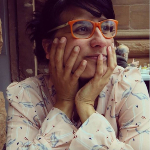
Cities, COVID-19 and its impact on the Brazilian landscape
Dr Ian Mell, Senior Lecturer in Environmental and Landscape Planning, School of Environment, Education and Development (SEED), discusses the impact the pandemic has had on cities in Brazil and their communities. This piece was co-written with Dr Camila Gomes Sant’Anna, a Visiting Research Fellow at the School of Environment, Education and Development researching green infrastructure as a tool of landscape planning and design, with Dr Ian Mell, research funded by Brazilian National Council for Scientific and Technological Development (CNPQ).
Some content on this page is available in Portuguese and English. Choose your language below.
What and who are cities for? Is their purpose economic growth, a platform for the arts or to provide habitats for diverse species? The COVID-19 pandemic has brought all of these issues to the fore.
Government, the media and, more importantly, communities have been forced to reconsider their relationships with cities as their freedom of movement has been curtailed by lockdowns.
The impacts of COVID-19 have been deeply felt by cities. Within the ‘new normal’ work-home balance, there is scope to assess the value of cities as places of sociability, mobility and trade. We know that regardless of income, everyone is susceptible to COVID-19, but low-income communities are at higher risk due to factors including crowded homes and barriers to working remotely.
A cautionary note is therefore needed when reflecting on the rights to the city – in fact, the right to its landscape, resources and amenities. This statement is wrapped up in an understanding of the social function of the land and how it supports urban development in Brazil, reconsidering its various biomes’ characteristics and its popular culture. This is needed in order to guarantee not only biodiversity and climate change adaptation, but also conservation of its cultural heritage and social inclusion.
Complexities
The reactions to COVID-19 in Brazil illustrate the complexity of these issues. As the infection rate rises – COVID-19 has been identified in 98% of cities – the government continues to focus attention on political scandal and partisan disputes.
Moreover, fires in the Amazonian forest, Pantanal, Cerrado and other places, a lack of basic amenities, and the continued disenfranchising of people from the landscape have established the environment as a fundamental topic of new urban ideas after the pandemic.
In the political and social spheres, however, disagreements are pervasive. Divisions within Brazilian society based on wealth and ethnicity have been reinforced, while the seriousness of COVID-19 has been downplayed in some quarters, inciting public unrest to ‘lockdowns’ established by state governments. This has proved deeply problematic because of the urban form of Brazilian cities, and the rights people have to essential resources such as water, electricity, housing and public space.
Those who can pay for private health and recreation do, while those subjected to austerity measures brought in after the 2014–16 recession take risks.
Dr Ian Mell / Senior Lecturer in Environmental and Landscape Planning
Cities in Brazil are complex amalgams of public and private land. Wealthy landowners may live tooth-to-jowl with favelas – where poor health and economic inequality are most prevalent. Lines of economic segregation are also acutely visible. Furthermore, the Brazilian government is promoting economic stability over the health and wellbeing of its people via their ‘right to come and go [out]’ approach. However, in defiant states, governments have set lockdown rules in an attempt to limit the spread of infection.
Furthermore, as 40% of workers in Brazil are employed in the informal sector they have little to no job security and are being forced to continue working to survive. As intergovernmental disputes roll on, people continue to be misinformed about the infection rate and are forced to make decisions regarding their own wellbeing.
Rights to the outdoors
Brazil is also a nation that lives outdoors. There is extensive use of public spaces, with an increased proportion located in wealthy areas. As a consequence of lockdown those without access to private country houses, beaches or resorts have been isolated in their homes. The lack of equity between parts of society has come to the fore because of COVID-19. Those who can pay for private health and recreation do, while those subjected to austerity measures brought in after the 2014–16 recession take risks.
Although Brazilian cities have extensive parks, beaches, riversides and public spaces, there is a variability in their location, availability, size and quality. People are therefore being pressured to make a choice: stay in their homes which lack infrastructure, educate their children and risk harming their wellbeing, or travel across a city to work and expose themselves to the infection – all while navigating overcrowded and irregular public transport. This is the crux of inequality in Brazil. Although amenities exist, they are not readily inclusive to all. As a consequence, people are curtailed in their use of public spaces and are limited in their ability to engage with exercise or with other people.
Development for all
It is not possible to blame COVID-19 for the ongoing difficulties faced by citizens in Brazil, but it has highlighted the prominence of inequality. However, there is no easy fix. Urban development is constrained by real estate speculation, a silent dismantling of environmental policies, and ongoing socio-cultural fragmentation including violation of indigenous minority rights. Planners are also subject to political pressures to deliver investment (normally for wealthier residents), which reinforce segregation. As Neckel et al. (2020) noted though, the provision of public parks has a positive impact on local economic prosperity and should be funded to provide amenities for all.
What COVID-19 has done is locate inequality squarely in the public mindset. Local lockdowns have made residents reconsider their urban rights, forcing politicians to explain why access to parks and public space is unequal. This illustrates the Brazilian capacity for resilience and in many places has led to protest: the Projetemoscollective is using luminous projections to spread awareness of the importance of changing our city landscapes, addressing the struggle not only to survive, but for a better life.
It is therefore necessary to rethink the way cities are planned in order to reverse the direction of traditional planning, thinking not about housing … but as a system of relationships, in which housing, infrastructure, production and the social are part of and engender the design of inhabiting territory. Although it would be foolish to consider COVID-19 a turning point for economic and socio-cultural equity in Brazil, it potentially places landscapes centre stage to guarantee development for all in the future.
-
Dr Ian Mell
Senior Lecturer in Environmental and Landscape Planning (SEED), The University of Manchester.
View Dr Ian Mell's research profile
-
Dr Camila Gomes Sant’Anna
Visiting Research Fellow at the School of Environment, Education and Development researching “The green infrastructure as a tool of landscape planning and design", with Dr Ian Mell.
View Dr Camila Gomes Sant’Anna's profile


